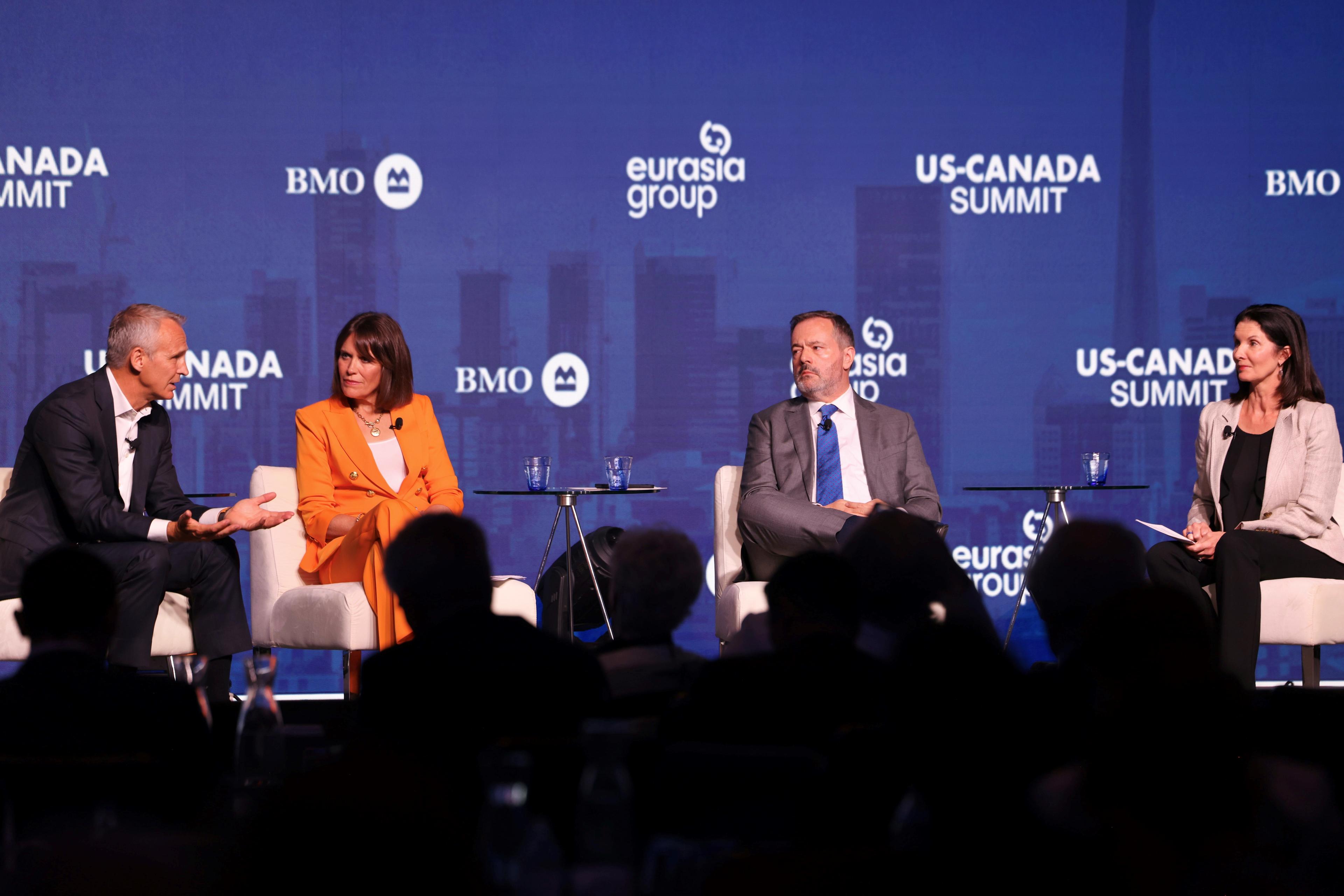The nature, culture and meaning of work are undergoing a dynamic transformation: automation, digitization and the advent of generative artificial intelligence (AI) are redefining how we work.
To understand the implications of these changes and help leadership adapt to them, I moderated a panel entitled “Work Under Pressure: AI, Generational Dynamics and the Future of Work” at the second annual US-Canada Summit hosted by BMO and Eurasia Group. Our panelists included:
Jason Kenney, Senior Advisor, Bennett Jones and former Premier of Alberta
Jennifer McCollum, President and CEO, Catalyst
Jonas Prising, Chairman and CEO, ManpowerGroup
Together, we discussed the need for organizations to prioritize reskilling and upskilling workers to keep pace with technological evolution and adapt to changing skills needs.
Here are some of the key takeaways from our discussion.
Hybrid work is here to stay
Jonas Prising, whose company ManpowerGroup has matched more than 2 million people to their ideal jobs, said labor markets are evolving around the preferences of individual workers, which are being influenced by technology as much as generational preferences. “The pandemic was a looking glass into the future,” he noted, adding that technological advances and the shift to remote work during the pandemic have since become normalized. “This is the new reality,” he said. “Hybrid work is here to stay.”
Prising also noted that while knowledge workers make up the bulk of hybrid work set-ups, other industries are beginning to embrace flexible work schedules as well. “The ability to choose the shifts that start late, or working so it fits with family schedules is starting to seep into other sectors that traditionally did not have that form of flexibility,” he said, adding that many organizations are still working to find the right balance.
Government policies can help lead the way
As a former federal minister as well as Alberta’s former premier, Jason Kenney came to the table with a unique perspective regarding the role of public policy in the workplace in both Canada and the U.S. He noted that while the Canadian government’s propensity to invest in skills training puts Canada among the top tier of countries in the OECD, it also needs to find a way to push the private sector to do the same.
Skills development that’s responsive to the changing needs of the market, whether it’s for newcomers or existing workers, will require partnerships between corporations, educational institutions and governments.
Futureproofing the workforce
The need for skills redevelopment is one we appreciate here at BMO. We’ve worked hard to embrace a skills mindset with our BMO Academy, which has helped more than 5,000 BMO employees attain micro-credentials in tech, such as cloud data.
Prising emphasized the importance of upskilling (which advances talent along the same career trajectory) and reskilling (which helps an employee switch to a new career) to narrow gaps in society brought about by globalization and technological transformation. Of particular importance is the need for people to learn to use new tools in new ways, as opposed to using technology to do the things they were already doing, just with a fancier name.
“Paradoxically, more technology places more emphasis on humanity or human skills: the ability to collaborate, communicate, show empathy, engage,” he explained.
Fostering the uniquely human elements that we can bring to the job requires collaboration across organizations, along with the government and nonprofit sectors. For these human elements to flourish within your organization, they need to be developed within the community through educational programs, and groups tackling complex challenges like kids' mental health.
Diversity is a business strategy
Skills development goes hand in hand with deepening talent pools as many organizations strive to become more diverse and inclusive. As head of Catalyst, a global nonprofit working to increase the presence of women – particularly marginalized women – in corporate leadership roles and promote workplace diversity, Jennifer McCollum sees a future in which diversity is the rule rather than the exception. “Within 20 to 25 years, diversity is going to be the default in our talent pool,” she said.
McCollum shared a profround quote from a CEO that recently resonated with her:
“Expanding my knowledge outside my core, professional and technical capability helps me see other perspectives that have made me a stronger executive and a better decision-maker.’”
Prising agreed and noted that Diversity, Equity and Includion (DEI) as a business strategy is crucial rather than something that checks boxes. “It’s a competitive advantage,” he said.
Changes in leadership style
This shift toward a more transparent and empathetic way of leading is improving employee retention, innovation and engagement. Catalyst’s research backs this up. McCollum noted that in one survey, 61% of the workers who said they had a very empathic leader said they had much more innovative work, and 76% said they were much more highly engaged.
Empathy in leadership, she posited, can have a real impact on business. “We know if we can increase engagement and reduce turnover in some of these large industries like retail, manufacturing, hospitality and even financial services, it could reduce turnover by about 10%, solving a $4-to-$7-billion problem.”
The forces of change that are transforming our workplaces and even the meaning of work are unyielding. But people can undoubtedly still thrive in their professions by embracing new ways of working, being open to learning new skills and new tools and understanding the business case for diversity and inclusion.
